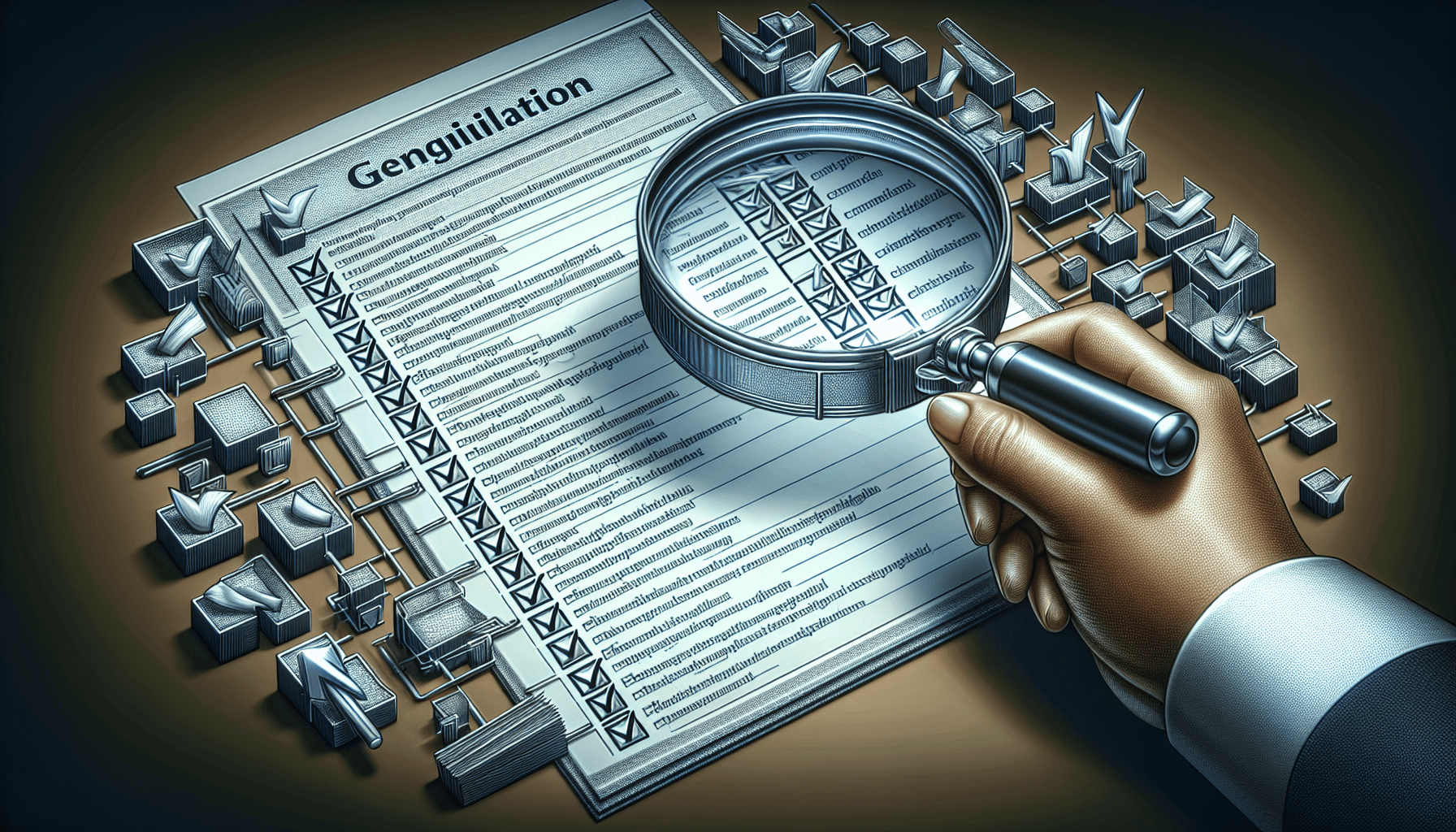In the ever-evolving landscape of business regulations and legal requirements, ensuring compliance has become a top priority for small businesses. Failure to comply with these regulations can result in severe financial penalties and reputational damage. To navigate this complex challenge, small businesses must prioritize compliance audits. In this article, we will provide valuable tips and insights for conducting successful compliance audits, helping small businesses minimize risks and maintain a strong and ethical business environment.

What is a Compliance Audit?
Definition of a Compliance Audit
A compliance audit is a systematic and independent examination of a company’s operations and practices to ensure that they comply with applicable laws, regulations, and industry standards. It involves a comprehensive review of the company’s policies, procedures, and internal controls to assess whether they are in line with legal requirements and ethical standards. The purpose of a compliance audit is to identify any areas of non-compliance and to provide recommendations for remediation and improvement.
Importance of Compliance Audits for Small Businesses
Compliance audits are of utmost importance for small businesses, as they play a crucial role in ensuring legal and ethical compliance. Small businesses often lack the resources and expertise to navigate the complex regulatory landscape on their own. Failure to comply with applicable laws and regulations can lead to severe penalties, legal consequences, and damage to the company’s reputation. Conducting regular compliance audits helps small businesses identify and address compliance issues proactively, mitigate risks, and maintain the trust of stakeholders. By demonstrating a commitment to compliance, small businesses can enhance their reputation, attract customers, and foster long-term growth.
Types of Compliance Audits
Financial Compliance Audits
Financial compliance audits focus on evaluating a company’s adherence to financial regulations, reporting standards, and internal controls. This type of audit ensures that the company’s financial statements accurately represent its financial position and performance. It includes a review of areas such as financial reporting, tax compliance, payroll processes, and internal accounting controls.
Environmental Compliance Audits
Environmental compliance audits assess a company’s compliance with environmental laws, regulations, and permits. They aim to identify and mitigate the risks associated with potential environmental hazards, pollution, and non-compliance with environmental standards. This type of audit includes a review of waste management practices, emissions control, hazardous materials handling, and compliance with environmental impact assessments.
Labor Compliance Audits
Labor compliance audits focus on evaluating a company’s compliance with labor laws and regulations, such as those related to minimum wage, overtime, working conditions, and employee benefits. These audits ensure that employees’ rights are protected, workplace safety standards are followed, and fair labor practices are upheld. Areas examined in a labor compliance audit may include employment contracts, payroll records, workplace health and safety protocols, and employee policies.
Data Security Compliance Audits
Data security compliance audits assess a company’s compliance with data protection laws, industry-accepted standards, and internal controls related to the management and protection of sensitive information. This type of audit ensures that appropriate security measures are in place to safeguard customer data, intellectual property, and confidential business information. Areas examined in a data security compliance audit may include data storage and encryption practices, access controls, incident response procedures, and compliance with data breach notification requirements.
Industry-Specific Compliance Audits
Industry-specific compliance audits are tailored to the specific regulations and standards that apply to a particular industry or sector. For example, healthcare organizations may undergo compliance audits to ensure adherence to healthcare laws and patient confidentiality requirements. Similarly, food service establishments may undergo compliance audits to ensure compliance with food safety regulations. These industry-specific audits focus on the unique compliance challenges and requirements faced by businesses operating in specific sectors.
Benefits of Conducting Compliance Audits
Identifying Compliance Issues
One of the primary benefits of conducting compliance audits is the identification of potential compliance issues. By thoroughly examining a company’s operations, policies, and procedures, an audit can uncover areas of non-compliance or weaknesses in existing controls. Identifying compliance issues early allows businesses to take corrective action before they become major problems, thereby mitigating the risk of penalties, legal consequences, and reputational damage.
Preventing Penalties and Legal Consequences
Failure to comply with applicable laws and regulations can result in significant penalties and legal consequences. Compliance audits help businesses proactively identify and address compliance issues, reducing the likelihood of penalties and legal action. By staying updated on the latest regulatory requirements and ensuring adherence to them, small businesses can avoid costly fines, lawsuits, and potential disruption to their operations.
Improving Operational Efficiency
Compliance audits not only focus on identifying areas of non-compliance but also highlight opportunities for operational improvements. By evaluating internal processes, controls, and policies, businesses can identify and address inefficiencies, redundancies, and gaps in their operations. Implementing recommended changes and streamlining processes based on audit findings can enhance overall operational efficiency, leading to cost savings and improved productivity.
Enhancing Reputation and Stakeholder Trust
A strong reputation and stakeholder trust are invaluable assets for any small business. Compliance audits demonstrate a commitment to ethical conduct and regulatory compliance, which in turn enhances a company’s reputation. By ensuring that their practices are aligned with legal requirements and industry standards, small businesses can build trust among customers, partners, investors, and other stakeholders. This trust can translate into increased customer loyalty, business opportunities, and a competitive edge in the market.
Preparing for a Compliance Audit
Understanding Applicable Regulations
Before conducting a compliance audit, it is essential to have a comprehensive understanding of the regulations that apply to the business. Small businesses must stay up to date with the latest legal requirements, industry standards, and pertinent regulations. This can be done by regularly monitoring regulatory updates, consulting legal experts, and engaging in industry-specific training and certifications.
Creating a Compliance Framework
Establishing a robust compliance framework is crucial for successful compliance audits. A compliance framework outlines the policies, procedures, and controls that the business must adhere to in order to comply with applicable laws and regulations. It should include clear guidelines on record keeping, reporting, monitoring, and internal controls. Small businesses should tailor their compliance framework to their specific industry, size, and operational needs.
Developing Internal Policies and Procedures
Internal policies and procedures play a critical role in ensuring compliance with applicable regulations. Small businesses should develop and document policies and procedures that reflect the company’s commitment to compliance and ethical conduct. These policies should be communicated effectively to employees to ensure their understanding and compliance. Regular reviews and updates of policies and procedures should be conducted to keep them relevant and aligned with regulatory changes.
Training and Educating Employees
Employees are key stakeholders in compliance efforts, and their understanding of applicable regulations and internal controls is crucial. Small businesses should provide adequate training and education to employees to ensure they are aware of their compliance obligations and understand the potential consequences of non-compliance. Regular training sessions and refresher courses should be conducted to keep employees informed about changes in regulations and best practices.

Hiring a Compliance Audit Specialist
Benefits of Outsourcing Compliance Audits
Outsourcing compliance audits to a specialist firm or consultant offers several benefits to small businesses. Compliance audit specialists bring a depth of knowledge and expertise in specific areas of compliance, allowing for a comprehensive and unbiased assessment of the company’s practices. They also provide an objective perspective, free from any internal biases or conflicts of interest. Outsourcing compliance audits can save time and resources for small businesses that may not have dedicated compliance teams or the expertise to conduct thorough audits internally.
Qualities to Look for in a Compliance Audit Specialist
When hiring a compliance audit specialist, small businesses should look for certain qualities to ensure an effective audit process. The specialist should have a strong understanding of relevant regulations and industry standards. They should possess excellent analytical skills, attention to detail, and the ability to identify potential compliance issues. Communication skills are also important, as the specialist will need to effectively communicate findings and recommendations to the business’s management and stakeholders.
Cost Considerations and ROI
Cost is an important consideration for small businesses when deciding whether to outsource compliance audits. While outsourcing may come with a financial investment, it is essential to assess the return on investment (ROI). The potential cost savings and avoidance of penalties and legal consequences resulting from an effective compliance audit can justify the investment. Small businesses should weigh the benefits of outsourcing against the costs and evaluate the long-term value that a compliance audit specialist can bring to their organization.
Conducting a Self-Assessment
Reviewing Compliance Documentation
Before conducting a compliance audit, small businesses should review their existing compliance documentation. This includes policies, procedures, manuals, and records related to compliance efforts. The review should ensure that the documentation is up to date, comprehensive, and reflects the current regulatory requirements. Any gaps or inconsistencies should be identified and addressed proactively.
Assessing Processes and Procedures
A self-assessment should involve a thorough evaluation of the company’s processes and procedures to determine their compliance with applicable regulations. This evaluation can be done through process mapping, flowcharts, or interviews with key personnel. Assessing processes and procedures helps identify any weaknesses, bottlenecks, or non-compliant practices that need to be addressed.
Identifying Areas of Non-Compliance
The self-assessment should aim to identify specific areas of non-compliance and their underlying causes. This can involve a comprehensive review of various aspects of the business, such as financial practices, environmental impact, labor practices, or data security measures. Identifying areas of non-compliance allows small businesses to prioritize remediation efforts and allocate resources effectively.
Developing Corrective Actions
Once areas of non-compliance have been identified, small businesses should develop appropriate corrective actions. These actions should address the root causes of non-compliance and provide a clear roadmap for achieving compliance. Corrective actions may involve implementing new policies or procedures, conducting employee training, or enhancing internal controls. Timelines, responsibilities, and performance measures should be defined to ensure accountability and tracking of progress.
Managing Compliance Audit Findings
Prioritizing Compliance Issues
Not all compliance issues are equal in terms of their potential impact or urgency. It is important for small businesses to prioritize compliance issues based on their severity, likelihood of occurrence, and potential consequences. This prioritization allows for efficient allocation of resources and enables businesses to focus on addressing the most critical issues first.
Developing Action Plans
Once compliance issues have been prioritized, small businesses should develop action plans to address each issue effectively. Action plans should clearly outline the steps to be taken, the resources required, and the timelines for completion. These plans should be realistic, achievable, and aligned with the company’s overall compliance objectives.
Assigning Responsibility and Accountability
To ensure that compliance issues are effectively addressed, it is essential to assign clear responsibility and accountability. Small businesses should identify individuals or teams who will be responsible for implementing the actions outlined in the action plans. Assigning responsibility ensures that there is clear ownership of each compliance issue and promotes a sense of accountability within the organization.
Tracking Progress
Tracking progress is crucial to ensure that compliance issues are being resolved in a timely and effective manner. Small businesses should establish mechanisms for monitoring and reporting on the progress of each action plan. Regular status updates, performance reviews, and follow-up audits can help track progress and ensure that corrective actions are being implemented as planned.
Maintaining Ongoing Compliance
Implementing Internal Controls
Internal controls are processes, policies, and procedures designed to ensure that a company’s operations are performed in a compliant and efficient manner. Implementing robust internal controls is essential for maintaining ongoing compliance. Small businesses should establish controls that prevent and detect non-compliant practices, such as segregation of duties, regular reconciliations, and documented approval processes. Regular monitoring and testing of internal controls should be conducted to identify and address any weaknesses or non-compliance issues.
Regular Monitoring and Auditing
Regular monitoring and auditing are essential for maintaining ongoing compliance. Small businesses should establish a systematic process for monitoring and auditing their compliance efforts. This can involve conducting periodic internal audits, self-assessments, and reviews of compliance documentation. External audits by independent auditors may also be necessary to provide an objective assessment of compliance. Regular monitoring and auditing help identify potential compliance issues before they escalate and ensure ongoing compliance with applicable laws and regulations.
Updating Policies and Procedures
Regulatory requirements and industry standards are subject to change. Small businesses should stay updated on relevant changes and update their policies and procedures accordingly. This can involve conducting periodic reviews of policies and procedures to ensure their alignment with current regulations. Communication and training sessions should be conducted to educate employees about any updates or changes to policies and procedures.
Staying Informed about Regulatory Changes
The regulatory landscape is dynamic and constantly evolving. It is important for small businesses to stay informed and up to date on regulatory changes that may impact their operations. This can be done by subscribing to industry newsletters, attending relevant conferences and seminars, and engaging with industry associations. Staying informed about regulatory changes allows businesses to adapt their compliance efforts accordingly and ensure ongoing compliance.
Common Challenges in Compliance Audits
Lack of Awareness and Understanding
Lack of awareness and understanding of applicable regulations is a common challenge faced by small businesses. Many businesses may not be aware of all the regulations that apply to their operations or may struggle to interpret and understand complex regulatory requirements. Addressing this challenge requires investing in employee training and education, as well as seeking external expertise to clarify regulatory obligations.
Limited Resources and Budget
Small businesses often face resource constraints when it comes to conducting compliance audits. Limited staffing, budgets, and time can make it challenging to allocate adequate resources to compliance efforts. To overcome this challenge, small businesses can consider outsourcing compliance audits to specialized firms or consultants who can provide the necessary expertise and resources. Implementing cost-effective compliance management tools and automation can also help streamline compliance efforts within limited budgets.
Complexity of Regulatory Frameworks
The regulatory landscape can be complex and overwhelming, particularly for small businesses with limited expertise in compliance. Navigating the maze of regulations and understanding their implications can be a challenge. Small businesses can overcome this challenge by seeking the guidance of legal experts, compliance consultants, and industry associations. These resources can provide clarity on the specific regulatory requirements and help small businesses develop effective compliance strategies.
Resistance to Change
Resistance to change within the organization can pose a significant challenge to compliance efforts. Employees may be resistant to new policies, procedures, or controls that are introduced as a result of compliance audit findings. Overcoming resistance to change requires effective communication, employee engagement, and the establishment of a compliance culture within the organization. Employees should be involved in the compliance process and provided with the necessary training and support to adapt to new compliance requirements.
Conclusion
Compliance audits are essential for the success and sustainability of small businesses. They enable businesses to identify and address areas of non-compliance, prevent penalties and legal consequences, improve operational efficiency, and enhance reputation and stakeholder trust. By preparing for compliance audits, hiring specialists when needed, conducting self-assessments, and maintaining ongoing compliance efforts, small businesses can navigate the regulatory landscape effectively and ensure long-term success. Despite the challenges that may arise during compliance audits, the benefits far outweigh the costs, making compliance audits an invaluable tool for small businesses.
Key Takeaways
- Compliance audits are systematic and independent examinations of a company’s operations and practices to ensure compliance with laws, regulations, and industry standards.
- Different types of compliance audits include financial, environmental, labor, data security, and industry-specific audits.
- Benefits of conducting compliance audits include identifying compliance issues, preventing penalties and legal consequences, improving operational efficiency, and enhancing reputation and stakeholder trust.
- Small businesses should prepare for compliance audits by understanding applicable regulations, creating a compliance framework, developing internal policies and procedures, and training employees.
- Hiring a compliance audit specialist offers benefits such as expertise, objectivity, and cost savings in the long run.
- Self-assessments involve reviewing compliance documentation, assessing processes and procedures, identifying areas of non-compliance, and developing corrective actions.
- Managing compliance audit findings requires prioritizing issues, developing action plans, assigning responsibility and accountability, and tracking progress.
- Maintaining ongoing compliance involves implementing internal controls, regular monitoring and auditing, updating policies and procedures, and staying informed about regulatory changes.
- Common challenges in compliance audits include lack of awareness and understanding, limited resources and budget, complexity of regulatory frameworks, and resistance to change.
- Compliance audits are crucial for small businesses to ensure legal compliance, mitigate risks, and maintain stakeholder trust in a competitive business environment.



